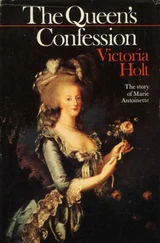Виктория Холт - The Captive Queen of Scots
Здесь есть возможность читать онлайн «Виктория Холт - The Captive Queen of Scots» весь текст электронной книги совершенно бесплатно (целиком полную версию без сокращений). В некоторых случаях можно слушать аудио, скачать через торрент в формате fb2 и присутствует краткое содержание. Жанр: Исторические любовные романы, на английском языке. Описание произведения, (предисловие) а так же отзывы посетителей доступны на портале библиотеки ЛибКат.
- Название:The Captive Queen of Scots
- Автор:
- Жанр:
- Год:неизвестен
- ISBN:нет данных
- Рейтинг книги:3 / 5. Голосов: 1
-
Избранное:Добавить в избранное
- Отзывы:
-
Ваша оценка:
- 60
- 1
- 2
- 3
- 4
- 5
The Captive Queen of Scots: краткое содержание, описание и аннотация
Предлагаем к чтению аннотацию, описание, краткое содержание или предисловие (зависит от того, что написал сам автор книги «The Captive Queen of Scots»). Если вы не нашли необходимую информацию о книге — напишите в комментариях, мы постараемся отыскать её.
The Captive Queen of Scots — читать онлайн бесплатно полную книгу (весь текст) целиком
Ниже представлен текст книги, разбитый по страницам. Система сохранения места последней прочитанной страницы, позволяет с удобством читать онлайн бесплатно книгу «The Captive Queen of Scots», без необходимости каждый раз заново искать на чём Вы остановились. Поставьте закладку, и сможете в любой момент перейти на страницу, на которой закончили чтение.
Интервал:
Закладка:
It is not because I have lost Scotland that I mourn. It is because I have lost the two I love more than any in the world—my lover Bothwell, and James my baby son.
She lay down and listened to the sound of her women whispering anxiously together; she heard the tramp of the sentinel outside her window. That was like the tramp of doom. They were determined that she should never escape from Lochleven. And in that moment, so deep was her despair, she believed she never would.
She was sunk in melancholy and would do nothing to rouse herself.
Now the night and days began to merge one into another and she lost count of them. Her French apothecary came to her bedside with potions for her to drink, but she would not touch them.
“Madame,” he declared, “you will die if you will not try to save yourself from death.”
“Let me die,” she answered. “I should be happier dead than a prisoner in Lochleven Castle.”
She lay in a haze of memories; she was happiest when she could not remember where she was, and that was often the case. She thought she was in France, the petted idol of the Court there, beloved of Henri Deux and his mistress the dazzling Diane de Poitiers; the adored wife of young François Deux; the hope of all her Guise relations. Through that dream the figure of Catherine de’ Medici moved like a menacing ghost, sending her back to Scotland when those who loved her were dead, sending her to unhappy marriage with Darnley, to the nightmare of his death—but to Bothwell. She must always remember that when she came back to Scotland she came to Bothwell. And then to Carberry Hill and Lochleven.
Lady Douglas came to her bed and tried to coax her to eat. But she had no desire to speak with Lady Douglas. Sir William came in the company of Lindsay and Ruthven; she turned her head away and would not even look at them.
Once a young man, whose looks proclaimed him to be a Douglas, came to her bedside and stood looking down at her.
He whispered: “Your Majesty, if there is some commission with which you would entrust me, gladly would I perform it.”
But she could not answer him because the expression on his face brought a lump to her throat; so she had closed her eyes, and when she opened them he had gone.
On another occasion a boy had stood at the end of her bed watching her . . . a strange boy, with a pert, freckled face. He had said with a broad accent: “Hello, Queen.” And she believed he must have been part of a dream, for suddenly he winked at her and was gone.
So the days passed in a melancholy haze.
Jane remonstrated with her. “Your Majesty, it is fourteen days since we came to Lochleven and you have scarcely eaten or drunk in all that time. You must rouse yourself. What if my lord Bothwell were to come for you? How could you escape with him, weak as you are?”
“I could not stand, could I, Jane,” she said. “There is no strength left in my limbs.”
“Your Majesty,” implored Jane, “before it is too late save yourself . . . for Scotland and your son who needs you.”
Those words kept repeating themselves in Mary’s mind. Save yourself . . . Save yourself for Scotland and your son who needs you.
The next day she ate a little; and the following day a little more.
Word went through the castle: “The Queen is beginning to take an interest in her surroundings. After all, she has decided to live.”
George Douglas lay on the grass, his eyes never straying long from those windows which were hers. He had thought of her continually ever since he had heard that they were bringing her to his home. He had pictured her as he had so often heard her described—beautiful beyond imagining; gowned in rich cloth of gold, velvet and silver, a crown on her head. He had remembered all he had heard about her romantic life; her early flight to France where she had become Queen; her three marriages, all ending in tragedy. He had heard the scandals which had been whispered about her when Darnley had been murdered. They called her adulteress, murderess, but he did not believe them. He had always believed her to be a deeply wronged woman, and since she was also beautiful she had become the center of his dreams of chivalry.
He was misunderstood in this rough country where men such as Bothwell were looked up to, where cold passionless men like his half-brother Moray were those whom others were ready to call their leaders.
When he had seen the Queen disheveled after her ordeal, almost demented, her gown tattered, her lovely features spattered with mud, his feeling had been more intense than he had imagined they ever could be. He loved the sick and lonely woman more than he ever could the Queen in her crown and royal robes. He was excited almost beyond endurance, because she was here in his brother’s castle, within his reach, and because she was a friendless prisoner and it might be in his power to help her.
During the last weeks he had sought excuses to go into her apartment. She had been unaware of him, lying listless in her bed, her eyes closed; and he had been afraid that, since she clearly no longer wished to live, she would die.
Once she had opened her eye and seen him and he had looked at her with such yearning that he believed he aroused some response in her. He had been begging her not to die, for if she died he wished to die also. He was young and of little account in the castle where his mother and brother ruled, and where Moray was considered to be the most important person in Scotland, but he was fierce in his desire to help her; he wanted to give his life for her. Willingly would he do so and count himself blessed. That was what he had tried to tell her.
Did she understand? Was it coincidence that a few days later he had heard that the Queen was taking a little nourishment?
“Hi, watchdog!”
George turned quickly and glared at young Willie, who had crept up silently and flung himself down on the grass beside him.
“Where did you come from?” demanded George, embarrassed to have been caught by this alert boy gazing at the Queen’s windows. “And your doublet is filthy.”
Willie grimaced, and wriggled his bare toes as though in ecstasy.
“ She does not notice my filthy doublet, Geordie watchdog. Why should she look at me when handsome Geordie’s near?”
George leaped up to cuff the boy but Willie was even quicker on his feet. He stood some little distance away and, placing his hands as though he held a lute, rolled his eyes like a lovesick troubadour in the direction of the Queen’s windows.
“You go to the kitchens. There’ll be work for you there, Willie Douglas.”
“Doubtless, doubtless,” cried Willie. “But there’s other than scullion’s work for me in the castle when we’ve a Queen living with us.”
George did not answer; he lay down on the grass once more and leaning on his elbows propped his face in his hands, this time making sure that he was looking, not toward the castle, but over the lake.
Willie watched him for a while; then he said: “There’s always fishing boats on the lake, Geordie.”
“And what if there are?”
“Nobody takes much notice of ’em, Geordie. They come and go between the island and the mainland.”
“Be silent,” said George fearfully and he rose to his feet again.
Willie hopped back a few paces assuming the posture of a troubadour.
George went after him, and Willie sped away, laughing over his shoulder. Down the slope he went to the shores of the lake, George in pursuit; but before George could catch him Willie was running into the lake where George, for fear of spoiling his sturtop boots, could not follow.
Willie stood, the water about his knees, still playing the troubadour.
Watching him in exasperation George’s eye was caught by a boat which was setting out from the mainland. As his keen eyes picked out the figures in the boat, he saw that they were not fishermen nor ferrymen, but strangers—grand personages with a look of the Court about them.
Читать дальшеИнтервал:
Закладка:
Похожие книги на «The Captive Queen of Scots»
Представляем Вашему вниманию похожие книги на «The Captive Queen of Scots» списком для выбора. Мы отобрали схожую по названию и смыслу литературу в надежде предоставить читателям больше вариантов отыскать новые, интересные, ещё непрочитанные произведения.
Обсуждение, отзывы о книге «The Captive Queen of Scots» и просто собственные мнения читателей. Оставьте ваши комментарии, напишите, что Вы думаете о произведении, его смысле или главных героях. Укажите что конкретно понравилось, а что нет, и почему Вы так считаете.










